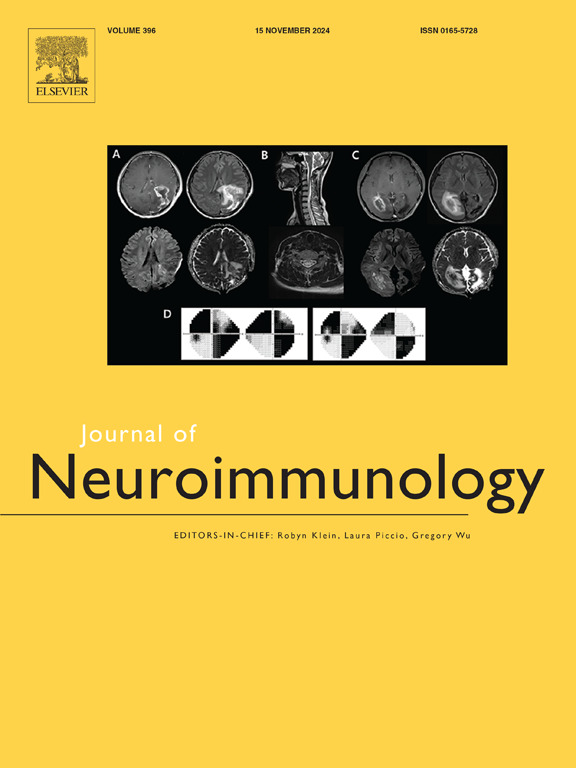硼替佐米治疗接受阿达木单抗的银屑病关节炎患者的抗n -甲基-d-天冬氨酸受体脑炎:1例报告和文献综述
IF 2.5
4区 医学
Q3 IMMUNOLOGY
引用次数: 0
摘要
抗- n -甲基-d-天冬氨酸受体抗体(Anti- nmdar)脑炎是一种严重的自身免疫性疾病,可发生在抗tnf -α治疗的患者中。阿达木单抗是一种完全人源的重组单克隆抗体,可灭活肿瘤坏死因子α (TNFα),用于治疗各种自身免疫性疾病。据报道,阿达木单抗的使用与自身免疫性脱髓鞘疾病相关,并增加恶性肿瘤的风险。与抗tnf -α治疗相关的抗nmdar脑炎对高剂量皮质类固醇、血浆交换程序(PLEX)以及随后的抗cd20单克隆抗体利妥昔单抗b细胞消耗有反应。然而,一小部分患者对类固醇、血浆置换和利妥昔单抗治疗仍然难治。在这些患者中,硼替佐米,一种蛋白酶体抑制剂,对于那些二线免疫治疗失败的患者是一种潜在的有效治疗方法。在这里,我们报告了一例严重的抗nmdar脑炎,患者为一名患有银屑病关节炎的39岁男性,在症状出现前接受阿达木单抗治疗两年。他对大剂量类固醇、血浆置换、静脉注射免疫球蛋白(IVIg)和利妥昔单抗(rituximab)无效。由于症状未缓解,在入院后44天给予4个周期的硼替佐米;随后,我们观察到神经系统逐渐恢复,住院94天后出院。本病例表明,硼替佐米可能有助于治疗阿达木单抗患者抗nmdar脑炎的难治性病例。本文章由计算机程序翻译,如有差异,请以英文原文为准。
Bortezomib for the treatment of anti-N-methyl-d-aspartate receptor encephalitis in a patient with psoriatic arthritis receiving adalimumab: A case report and literature review
Anti -N-methyl-d-aspartate receptor antibody (Anti-NMDAR) encephalitis is a serious autoimmune disease that can occur in patients on anti–TNF-α therapy. Adalimumab is a fully human, recombinant monoclonal antibody that inactivates tumour necrosis factor-alpha (TNFα) and is used to treat various autoimmune diseases. The use of Adalimumab has been reported to be associated with autoimmune demyelinating conditions and increases the risk of malignancies. Anti-NMDAR encephalitis associated with anti–TNF-α therapy responds to high-dose corticosteroids, plasma exchange procedures (PLEX), and subsequently, B-cell depletion by the anti-CD20 monoclonal antibody rituximab. A small subset of patients, however, remains refractory to steroids, plasma exchange and rituximab therapy. In these patients, Bortezomib, a proteasome inhibitor, is a potentially effective treatment for those who fail second-line immune therapies.
Here, we report a case of severe anti-NMDAR encephalitis in a 39-year-old man with psoriatic arthritis who was on Adalimumab treatment for two years before symptom onset. He was refractory to high-dose steroids, plasma exchange, intravenous immunoglobulin (IVIg), and rituximab. Four cycles of Bortezomib were administered 44 days after hospital presentation due to non-resolution of symptoms; following which, we observed gradual neurological recovery, and he was discharged after 94 days of hospital admission. This case demonstrates that Bortezomib may be useful in treating refractory cases of anti-NMDAR encephalitis in patients on Adalimumab.
求助全文
通过发布文献求助,成功后即可免费获取论文全文。
去求助
来源期刊

Journal of neuroimmunology
医学-免疫学
CiteScore
6.10
自引率
3.00%
发文量
154
审稿时长
37 days
期刊介绍:
The Journal of Neuroimmunology affords a forum for the publication of works applying immunologic methodology to the furtherance of the neurological sciences. Studies on all branches of the neurosciences, particularly fundamental and applied neurobiology, neurology, neuropathology, neurochemistry, neurovirology, neuroendocrinology, neuromuscular research, neuropharmacology and psychology, which involve either immunologic methodology (e.g. immunocytochemistry) or fundamental immunology (e.g. antibody and lymphocyte assays), are considered for publication.
 求助内容:
求助内容: 应助结果提醒方式:
应助结果提醒方式:


